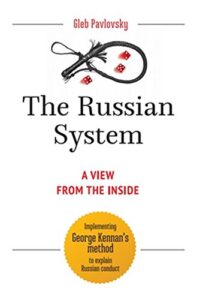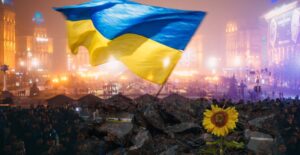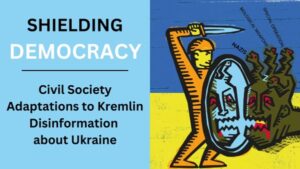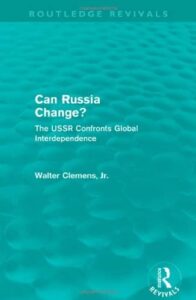Russian President Vladimir Putin’s former adviser and Soviet-era dissident Gleb Pavlovsky (above) died on Monday at the age of 71 after a prolonged illness, Reuters reports.
An influential figure in Russia’s post-Soviet political architecture and in Putin’s initial tenure, Pavlovsky turned critic of the Russian president after his adviser contract was terminated in 2011, it adds. Pavlovsky, who called himself a “political technologist,” was key in forming Russia’s “managed democracy” when an advisor to Putin, which led to tight control of civil society and the opposition.
 The author of The Russian System: A view from the inside, Pavlovsky was arrested in the early 80s for his part in an underground journal. But after collaborating with the authorities he was exiled to the north, rather than jailed, according to one account:
The author of The Russian System: A view from the inside, Pavlovsky was arrested in the early 80s for his part in an underground journal. But after collaborating with the authorities he was exiled to the north, rather than jailed, according to one account:
Under Gorbachev he returned to Moscow, becoming an active publicist in the democratic ferment of the time, before throwing in his lot with Yeltsin and helping to organize the rigged election that kept him in the Kremlin in 1996. Thereafter he was an architect of ‘managed democracy’ under Putin, whom he could observe closely for over a decade of service, until in the spring of 2011 he opposed his patron’s return to a third Presidency, and was dismissed.
“Many Western observers find it difficult to understand that, for most Russians, Putin is not simply a president but the true founder of the post-Soviet Russian state,” Pavlovsky and political scientist Ivan Krastev argued. “There is no critical mass of [Russians] demanding radical change.”
But a year after the invasion of Ukraine, the fact that Russians continue to find ways to oppose and resist the war—albeit in ways not always visible to outside observers—has important implications for the future of the war and of Russia itself, notes Dylan Myles-Primakoff, senior manager for Eurasia Programs at the National Endowment for Democracy (NED) and a nonresident senior fellow at the Atlantic Council’s Eurasia Center.

Credit: NDI
As the war goes into its second year, public sentiment constraints on Russia will persist. Economic sanctions will continue to degrade Russians’ quality of life; as political scientist Samuel Greene has pointed out, this has the potential to turn individual resistance into collective resistance with a broad social base, he writes for Foreign Policy:
A second wave of mobilization, which military analysts now see as almost certainly necessary, could have the same effect. During the first mobilization wave, the government concentrated call-ups among Russia’s poorest citizens and ethnic minorities while disproportionately passing over urban middle-class Russians who have considerably more political voice. A second wave would be forced to draw more heavily from that population.
 “To defeat Ukraine on the battlefield, Russia needed to strangle all sympathy and support for Ukraine as well,” analysts at the Atlantic Council’s Digital Forensic Research Lab wrote in a new report analyzing the Kremlin’s information operations in Ukraine, NPR reports.
“To defeat Ukraine on the battlefield, Russia needed to strangle all sympathy and support for Ukraine as well,” analysts at the Atlantic Council’s Digital Forensic Research Lab wrote in a new report analyzing the Kremlin’s information operations in Ukraine, NPR reports.
But civil society adaptations pre-empted and frustrated the Kremlin’s disinformation operations, according to a recent report from the NED’s International Forum.
Iron-clad solidarity until victory is the spirit this evening as we commemorate the one-year mark of Russia’s full-scale invasion of Ukraine hosted by @mmagierowski of @PolishEmbassyUS & @apolyakova of @cepa with @OMarkarova @SenatorRisch & Polish First Lady Kornhauser-Duda. pic.twitter.com/xBuYEoBbhH
— Damon M. Wilson (@DamonMacWilson) March 1, 2023
 As Antony Blinken makes his first visit to Central Asia as U.S. secretary of state this week, Uzbek and Kazakh civil society activists are asking the U.S. to push for systemic reforms without which, they argue, these republics will not be able to overcome geopolitical challenges, including preserving their independence, VOA reports.
As Antony Blinken makes his first visit to Central Asia as U.S. secretary of state this week, Uzbek and Kazakh civil society activists are asking the U.S. to push for systemic reforms without which, they argue, these republics will not be able to overcome geopolitical challenges, including preserving their independence, VOA reports.
“We have seen some positive action by the Uzbek government, but it has a long way to go in terms of allowing political freedoms and space for pluralism,” Abdurahmon Tashanov, who heads the Ezgulik Human Rights Society, told VOA from Tashkent. “The state must ease the registration of nongovernmental organizations and political parties. The authorities don’t seem to want to take these steps.”
 Dictator’s dilemma
Dictator’s dilemma
Comparing China and Soviet-era Bulgaria, with long side glances at other authoritarian regimes, Martin K. Dimitrov’s Dictatorship and Information: Authoritarian Regime Resilience in Communist Europe and China shows in remarkable detail how such governments obsessively collected information on dissenters, not just to target them but to preempt protest by focusing the delivery of economic largesse in restive areas, Columbia University’s Andrew Nathan writes for Foreign Affairs.
The dictator’s dilemma arises from an incapacity to calibrate repression and concessions due to the lack of information about elite and popular discontent. In ethnically heterogeneous countries, compactly settled ethnic minorities present a further obstacle for establishing a panoptical authoritarian vision, Dimitrov contends. Although the dictator’s dilemma can be solved and abundant information does extend authoritarian lifespans, information cannot ensure the indefinite survival of dictatorships, he concludes.
Regimes can head off some protests, keep some small, and disarm others with concessions—what Dimitrov calls “a low-repression equilibrium”—but only as long as they command sufficient economic resources, Nathan adds. In China, despite its unprecedentedly sophisticated intelligence-gathering systems, small-scale protest is chronic. “Time will tell how long such a system based on routine disruptive contentious episodes can persist,” Dimitrov concludes.
 Autocratic regimes lag behind democracies on every index of human development and happiness, notes a leading analyst.
Autocratic regimes lag behind democracies on every index of human development and happiness, notes a leading analyst.
There is significant public discontent in China and Russia, though it’s not always easy to assess how much, and whether those peoples would like a change of regime, says former Harvard professor Walter Clemens, author of Can Russia Change?
But we do know that ordinary people are unable to change the ruling elites and their policies, and can thus conclude that this somber picture will persist; this is bad for its victims and not good for the West, he writes for the Center for European Policy Analysis (CEPA).
Boris Nemtsov @BorisNemtsov liked to quote Sakharov that “if you aren’t sure how to act, act according to your conscience”. This is how he lived his own life. He said what he believed and did what he said. Never betrayed his principles or his friends. pic.twitter.com/TrPPSGEQUC
— Vladimir Kara-Murza (@vkaramurza) February 27, 2023







